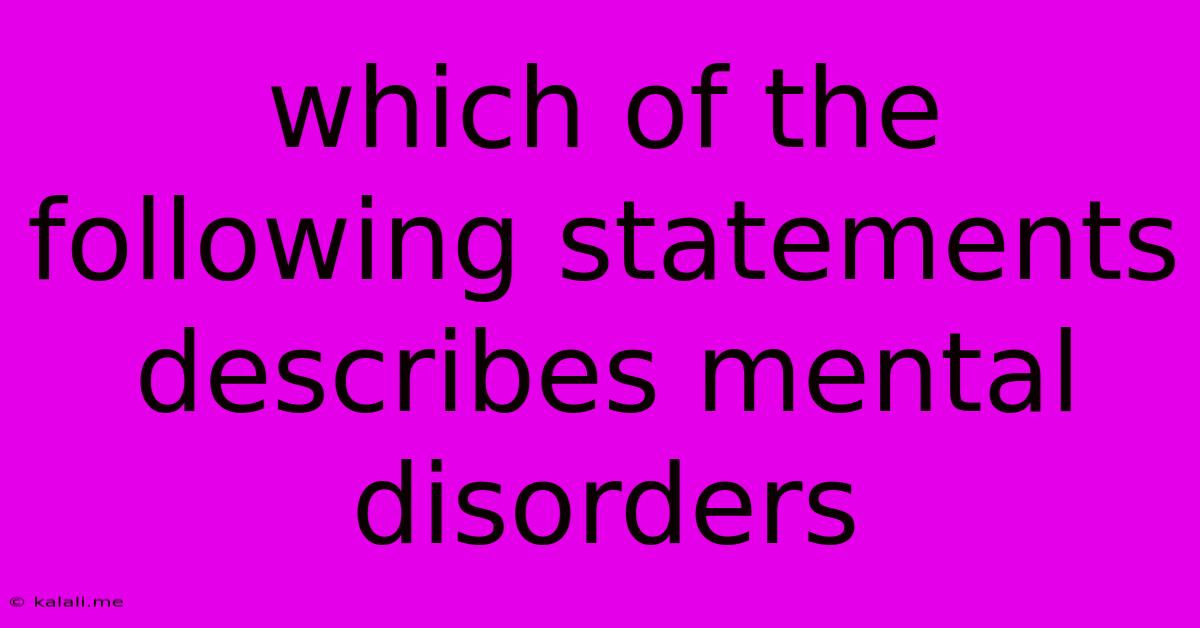Which Of The Following Statements Describes Mental Disorders
Kalali
Jun 14, 2025 · 3 min read

Table of Contents
Which of the Following Statements Describes Mental Disorders? Understanding the Nuances
Mental health is a crucial aspect of overall well-being, yet understanding mental disorders can be challenging. Many misconceptions exist, leading to stigma and hindering access to necessary support. This article clarifies what constitutes a mental disorder, debunking common myths and providing a clearer understanding of this complex topic. We will explore the key characteristics used by mental health professionals to define and diagnose mental illnesses.
The simple answer to the question, "Which of the following statements describes mental disorders?", depends on the statements provided. However, we can define what makes a statement accurate in describing a mental disorder. A correct statement will highlight the following key features:
1. Clinically Significant Disturbance: A mental disorder isn't just feeling sad or anxious occasionally. It involves a significant disturbance in a person's cognitive, emotional, or behavioral functioning. This disturbance causes distress or impairment in social, occupational, or other important areas of life. This means the symptoms are severe enough to interfere with daily life, relationships, or work.
2. Persistent and/or Recurrent Symptoms: A fleeting feeling of sadness doesn't qualify. Mental disorders are characterized by symptoms that persist for a significant duration or recur frequently. The specific timeframe varies depending on the disorder, but it's more than just a temporary response to a stressful event. The persistence and recurrence are key to distinguishing temporary setbacks from diagnosable conditions.
3. Not a Socially Expected Response: Grief after the loss of a loved one is a normal and expected response. However, if the grief is prolonged, intense, and significantly impairs daily functioning, it might indicate a mental disorder like major depressive disorder. The context of the symptoms is crucial. It's essential to consider whether the reaction is appropriate within the given social and cultural context.
4. Not Due to Direct Physiological Effects: While certain medical conditions can cause psychological symptoms, a mental disorder is not solely a result of a direct physiological effect of a substance (like drug intoxication) or a general medical condition. For example, depression caused by a hormonal imbalance is different from major depressive disorder, although they might present with overlapping symptoms. Differential diagnosis is crucial.
5. Defined by Diagnostic Criteria: Mental health professionals use standardized diagnostic criteria, such as those found in the Diagnostic and Statistical Manual of Mental Disorders (DSM-5) and the International Classification of Diseases (ICD-11), to diagnose mental disorders. These manuals provide a structured approach to evaluating symptoms and making a diagnosis, ensuring consistency and accuracy.
Examples of Statements that Might Accurately Describe Mental Disorders:
- A mental disorder involves persistent and significant disturbances in a person's thoughts, feelings, or behavior that cause distress or impairment.
- Mental disorders are diagnosed based on a combination of observable symptoms and self-reported experiences, using established clinical guidelines.
- A mental disorder is more than just a temporary reaction to stress; it represents a significant and enduring disruption in psychological functioning.
Examples of Statements that Would Not Accurately Describe Mental Disorders:
- A mental disorder is simply weakness or a character flaw.
- A mental disorder is always caused by a traumatic childhood experience.
- Anyone can overcome a mental disorder through sheer willpower.
Understanding the complexities of mental disorders requires avoiding generalizations and stereotypes. This nuanced approach is vital for reducing stigma and promoting understanding and support for individuals affected by these conditions. If you or someone you know is struggling with mental health concerns, seeking professional help from a qualified mental health professional is essential.
Latest Posts
Latest Posts
-
Increasing Wavelength Of Light Goes In This Order
Jun 14, 2025
-
Are Pounds And Kg The Same
Jun 14, 2025
-
What Is The Antonym Of Frugal
Jun 14, 2025
-
What Is The Rhyme Scheme Of The First Stanza
Jun 14, 2025
-
Average Sat Score For Kennesaw State University
Jun 14, 2025
Related Post
Thank you for visiting our website which covers about Which Of The Following Statements Describes Mental Disorders . We hope the information provided has been useful to you. Feel free to contact us if you have any questions or need further assistance. See you next time and don't miss to bookmark.